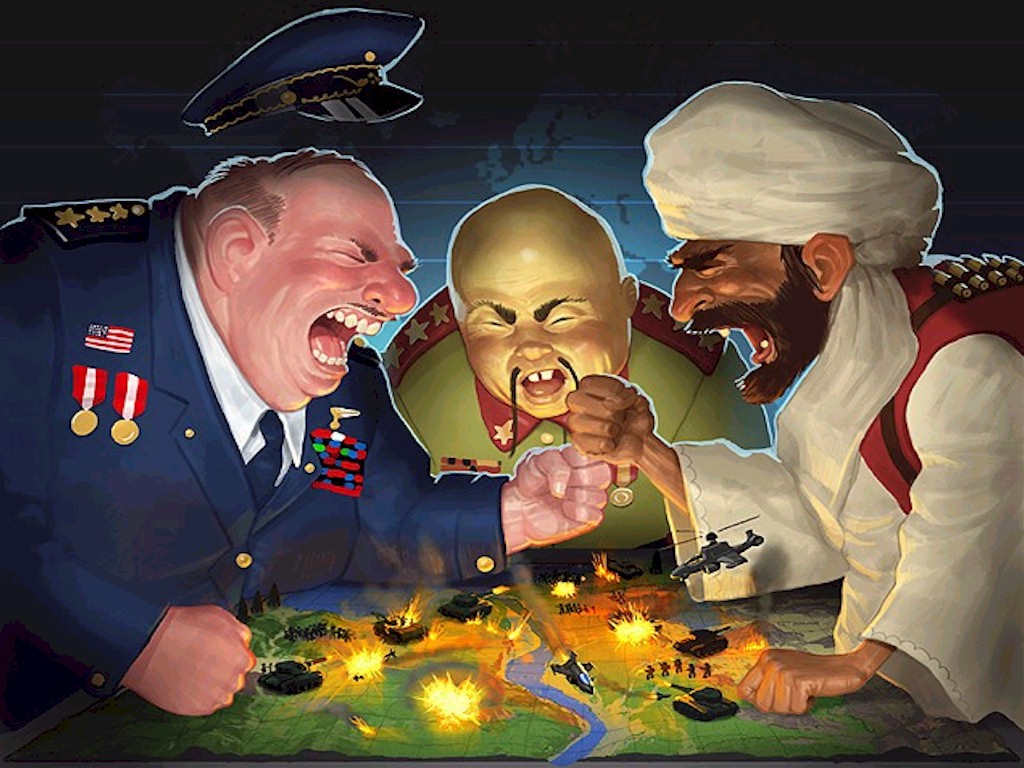
or: Why You Can't Understand IOT Militarism with a 21st Century Economy
It's every military-industrial complex's wet dream: an entire economy
predicated on aggressive war. A common misconception held by the
Imperium Offtopicum player base is that outside of explicitly
conquest-oriented games such as SonRISK, the series is not about
wargames. Many players have frequently objected to the sort of naked
aggression demonstrated by warlords like christos200 and Patriotic_Fool;
even when they bemoan Multipolarity 5's boast that it will completely
remove the military sphere, they still maintain that IOT is about more
than armies duking it out in the field. Sadly, such prescriptive
sentiments only serve to obscure the underlying structure that has
provided the impetus for these problem players' imperial ambitions.
Ironically, it is the economy, not the military, that provides
the greater reinforcement to this ethos, and the failure by players and
game moderators alike to realize this fact is the reason attempts to
reform IOT's core philosophy have so routinely failed. There is no
clearer evidence that IOT has become a wargame than the market design of
every title that has implemented hard statistics. Game moderators have
tried to escape the paradigm of gunboat diplomacy through a number of
means: back-door spy attacks, NPC-based power checks, punitive
resistance mechanics, to name a few. But these are all attempts to
circumvent the inherent problem of an economy teleologically grounded in
fuelling war.
In "The Death of
IOT", I argue that the shift to stats-based rulesets, originally
intended as a means to combat powergaming, ended up subverting the game
culture, turning warmongering into the norm rather than the exception.
At first I had attributed this to the psyche of the incoming player
base, mechanical mindsets geared toward finding the winning formula
within hard numbers rather than simply drifting freely through the
roleplay. Certainly, that attitude exists, in regulars as well as the
troublemakers; but I have since realized that far from merely catering
to the play style currently in vogue, the rules actively and
subconsciously frame the games toward a particularly military form of
competition, regardless of the purported genre and any other supposed
venues of power. The reason, as IOT's resident economic advisor Sonereal
first articulated, is that the base economic model developed after IOT
IV was built exclusively with combat in mind.
Early IOTs, by virtue of their simplicity and the casual culture of the
founding player base, were about diplomatic interactions, not the sort
of empire-building that they are today. While they had war, they were
not wargames, and beyond the inaugural problem players were not treated
as such. Thus, when the push began for a stabilized combat system, we
conceived it as an auxiliary feature rather than a core component. The
results were stopgaps that varied widely and were frequently criticized
for being too arbitrary or 'unrepresentative',1 and creating
a 'comprehensive' combat system became the primary focus of the IOT V
development thread. It was during these deliberations that the
militarist framework took root: as war had been the primary venue of
powergaming, it dominated the discourse, while the civil sector was
completely ignored. The result was that income could be applied either
toward military units and technology to increase their strength, or to
improve the rate of income, which would then be spent on the military.
It is a decidedly Medieval ethic of statecraft: one raises more funds to
support a larger army that is then used to seize the territory of rivals
to grow the revenue base. In hindsight, the irony is tragically
hilarious: in an attempt to control war, we had inadvertently made it
the sole mechanical focus.
Although successive games have attempted to articulate economics with
greater variety, they all begin and end, consciously or otherwise, with
the primacy of military investment. Systems have become more
nuanced—province-based income superseded by an interplay of industrial
infrastructure, population, and in some instances material supplies;
complex mechanisms governing international trade—but the end purpose
remains the same: bankrolling the army. It is neorealism at its finest:
security, and more specifically security through force, is the be-all
and end-all of the state. This is problematic because most games do not
advertise themselves as glorified RISK, and in the
past two years have deliberately sought to diversify their appeal away
from purely military strategy. While such attempts may manage to stymie
prolonged war, they have failed to transcend the militarist mindset. The
reason is that there is yet no game to offer an alternative paradigm; as
Sonereal bluntly explains, there is simply nothing other than military
or army-auxiliary sectors in which to invest. Economic innovation has
always been intensive rather than expansive: GMs have greatly
complicated market mechanisms, but the scope of the system has remained
unchanged.
Call me a dirty socialist, but I believe there is an important causal
relationship between the drive to war and the market system presupposed
in virtually every post-provincial-income game, especially
Taniciusfox's: that of free-market capitalism.2 Setting aside
grander ethical debates, capitalism is based on the commodification of
goods, services, and most importantly, labour. It operates within a
strict mathematical framework that discounts any variable that cannot be
quantified to fit the operational equation. Its effect on IOT, both in
rule structure and player thinking, cannot be overstated: the
capitalist mentality, which views everything in terms of cost-benefit
analysis, has no place for 'irrational' moral qualms or truly random
outside interference. Thus, with the sole exception of player-to-player
politicking, everything is made to be as predictable as
possible: even when confined to a black box, the economy is so rigidly
formulaic that the most maths-adverse player can make a reliable
estimate on an investment's end return; combat boils down to whose
number set is higher based on sheer quantity, be it troops or tech
levels. Supposedly, "random chance" is acknowledged (economic booms and
busts, roleplay "bonuses" for combat), but this, too, is calculated
within the overarching framework, a false 'exception' that reinforces
the rule.3
The trouble is, Taleb's "black swans" exist irrespective of what is most
convenient to the working model. IOT reformers such as myself criticize
this 'mainstream' market mentality for outright ignoring most of the
complex and interconnected influences that affect that same market's
viability: environmental degradation, domestic political activism,
refugee crises, the entire destruction of a generation through war, and
so forth. More importantly, in the centuries since feudalism, the
state's responsibilities have dramatically expanded; contrary to
libertarian demagogues, it is the government that creates and maintains
the necessary preconditions for a so-called healthy competitive market.
Even in one of the most militaristically-oriented countries, North
Korea, defence spending only accounts for one quarter of annual state
expenditure. Some players—indeed, some GMs—would argue that the
administrative details are "boring" and needn't be emphasized, or that
the day-to-day management and distribution of public services can be
assumed from (God forbid) GDP stats. Some might claim such a holistic
scope would turn IOT into a bureaucratic simulation involving mountains
of spreadsheets. These sentiments disregard the possibility that a)
players want to tinker with the nuts and bolts of the machine,
and b) by virtue of the GM's own limited patience, such a sim would try
to drastically simplify the sort of statistical nightmare that is a
Paradox Interactive game. Besides which, IOT already is a game
played with spreadsheets; we simply chose to slap a tank on the
packaging, rather than a health minister.
Once one understands IOT combat as a microcosm of capitalist thinking,
the reason for the militarist paradigm becomes clear. Wars are not
soldiers fighting and dying in the field; they are competing investments
to acquire property and resources. What little passes for enshrined
statecraft in the ruleset is not about managing the citizens of a
country, but about allocating capital to maximize profit in a perverse
allegory of the financial sector. Combat is competition. Wars are
hostile takeovers. State conquest is a merger. The sole motivating
benefit of war, as reflected in the narrow and market-oriented scope of
most games' set mechanics, is to acquire commodities: provinces,
population, and in the few games that use them, natural resources. The
rational actor model, coincidentally the foundation for both liberalism
and (neo)realist philosophy, absolves itself of all moral
considerations—of all moralizing factors—to justify a system
predicated on perpetual expansion. Wars aren't waged in support of the
market; they are themselves a market mechanism, pillage and plunder a
key strategy to accelerating a player's fiscal feedback loop.
Traditional rulesets reinforce this premise by subordinating what might
otherwise be independent variables to the military-industrial frame.
Take, for instance, popular approval, or national stability. While in
more recent games Taniciusfox has tried to diversify the contributing
factors, approval rating remains in a slavish inverse relationship to
tax rates: low means high and high means low, despite the fact that, as
demonstrated by the Scandinavian countries, under a committed government
high taxes fund an extensive social welfare system that alleviates the
sort of day-to-day suffering that foments discontent. Or take population
growth, which is always assumed to be constant, always assumed to be
positive, and always assumed to be sustainable. Time and again, from
resistance4 to clientage5 to
espionage6, the full scope of a field is dumbed down to fit
within a market-friendly frame. Nowhere is this reduction more
recognizable than the comical trivialization of nuclear weapons:
stupidly simple to obtain and costing nothing to maintain, with fallout
dispersing in mere turns and leaving no permanent damage to the land
or the government's reputation at home, they are functionally
reduced to recessions in a can, deployable at a player's leisure against
his business rivals.
Why has the deterrent of mutually assured destruction consistently
failed? For the same reason the linear market model is such a popular
basis for a game's economy: the true costs of the system are ignored in
favour of an idiot-proof arithmetic. By divorcing policy decisions from
their real consequences (at least insofar as one can apply the term to a
forum game), players are absolved of any true sense of responsibility.
Waging war need not concern the leader with citizens' welfare when he
knows the population will rebound regardless of the carnage, the
resistance will dissolve in a year, and the standard of living will
magically diffuse without any intervention whatsoever from the capital.
Exponential military growth is the logical outcome when troops are never
short of supply and the game is not built to handle the effects of a
demographic sector that consumes economic resources without reciprocal
contribution. Most importantly, when citizens are portrayed as mere
percentile modifiers to industrial output rather than individuals with
real-world needs and diverse attitudes, when they can be consistently
bought off through short-term tax breaks instead of meaningful long-term
reform, when the game is designed such that they have no real
say in the goals and management of their own state, why indeed
should a player invested with supreme power whether nominally a despot
or democrat concern himself with the mere well-being of his subjects?
Little surprise, then, that in an atmosphere devoid of moral
repercussions and governed by strict cost-benefit analysis, nuclear
weapons, technology deemed so catastrophically destructive that they
have never been used offensively since Nagasaki, in IOT are deployed,
often liberally, in the first strike as a matter of course.
Militarism in early IOTs was regarded as deviant behaviour by
powergaming players. In the games since IOT 7, however, this perspective
is no longer sufficient for explaining why aggressive expansion has
become the norm even amongst the same players that once denounced it.
Structuralism, be it realist or ideational, dictates that behaviour is
shaped by the system in which the actors participate. In the case of
IOT, the adoption of a specifically capitalist-oriented economy and its
accompanying ethos has, largely subconsciously, reshaped the terms of
interaction such that imperial expansion is the predominant, if not the
only way to play. Market-centric mechanics reduce state
responsibility to empowering the economy and thus increasing revenue,
whose only real application is to expand the military, in turn used to
seize the assets of rival powers to further bolster economic strength in
a perpetual cycle. With domestic sectors disregarded by the ruleset, any
concern for the well-being of the citizenry is discretionary, the only
feedback the roleplay of the ruling player himself. Even in games that
try to broaden their appeal through "soft power" tactics, the
overarching framework remains rooted in brute force, a reflection of the
failure of both players and game moderators to recognize this structural
fault. Now, I don't pretend to think there's some irrefutable argument
that'll suddenly make the usual suspects project a conscience toward
text on a screen; and that is precisely why the civil sphere must be as
mechanically well-developed as the military. There are dozens of other
potential aspects to running a country that IOT could emphasize, and
Project Marmot's end goal is precisely such a diversification away from
the linear path to militarism. The trick, of course, is finding a GM
with the organization and patience to manage a game of such broad scope.
Nonetheless, if the player base puts any validity into the inspirational
drought that provoked the supposed Fall Crisis this past September, this
may be exactly the sea-change we need to pursue.
1 - A notable exception was my battle simulations early in IOT IV. While
not devoid of controversy, they were regarded as the least abstract
combat system before and after, both in terms of execution and result,
and were only abandoned due to their considerable time investment.
2 - Taniciusfox in particular champions a libertarian bias, as evidenced
by his games' routine feature of "brain drain", where industry from
states with high tax rates is redistributed to states with low tax rates
as a reflection of private enterprise shopping for the cheapest
overhead. Apparently, even under Socialist governments, state-run
companies do not exist.
3 - In one of the most damning testaments to this truth, Taniciusfox
once admitted that in order to remain "fair", he judged roleplay solely
on quantity and completely disregarded the content of the post, at least
in respect to the actual bonus.
4 - Perhaps Taniciusfox's most glaring oversight in his various attempts
to de-emphasize war was failing to make resistance to foreign occupation
a persistent event. Constant attacks on troops and industry,
particularly if they incurred losses faster than they could be
replenished, would be a powerful motivator for the withdrawal of, or at
the very least a negotiated settlement by, the invader. Instead, and in
contravention of virtually every historical precedent, resistance occurs
for a few turns following invasion before abruptly terminating.
5 - The Multipolarity series' client mechanic is the most brazen example
of the plunder-based economic ethos. The term "client state" is itself a
misnomer, as the suzerain usually does not provide aid beyond the
initial purchase investment; "vassal" is a more accurate description of
the relationship. In addition to extracting a tithe from client states,
the player country gradually annexes the territory through an automatic
and uncontested process. Had any game lasted long enough, non-player
countries and the "soft power" strategy they were supposed to encourage
would have vanished entirely.
6 - Espionage, like combat, traditionally relies on numerical
superiority for success through a similar algorithm of agents and tech
level. Developed in an attempt to circumvent the same mathematical
fallacies of linear combat, it only served to transpose the strategy to
a new sphere.
The Cult of the Offensive by @Thorvald (El Thorvaldo)
Originally published as a DeviantArt journal in November 2013 and reposted verbatim to CFC proper three days later, this is a follow-up of sorts to "The Death of IOT", dissecting in detail exactly why the mechanization of gameplay had turned a casual form game into a blood sport. It was received with nigh-unanimous approval compared to its predecessor, with even its ostensible targets for critique (Sonereal and Taniciusfox) acknowledging blind spots in their rulesets, although whether their later games actually tried to "demilitarize" or just obfuscate the ethos better is up for debate. Indeed, Sone pinched the essay's title and my person for a 2016 thread that doubled down on the military-industrial zeitgeist.
Whether this specifically catalyzed the "Storyist Revival" of next year, no-one has ever declared to me, though the vanguard Imperium Offtopicum XIV launched the month after this was posted.
RIP whatever description I'd written for Buzzly.
Comments & Critiques (0)
Preferred comment/critique type for this content: Any Kind





Leave a Comment
You must be logged in and have an Active account to leave a comment.
Please, login or sign up for an account.